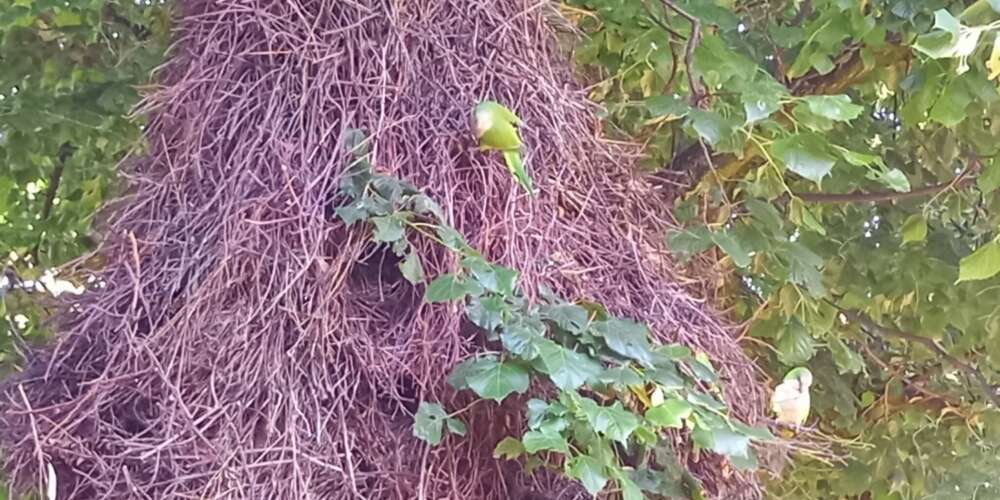
In 1050 Brussels there is a square called the Arezzoplein. In one to several trees hangs a large bag or something of that nature built from branches and something like clay. In it live parrot-like birds on the back colored green and below more light gray or beige and a flesh-colored curved beak. Well, these bags, which are their commune nest
In the bustling city of Brussels, at place Guy d’Arezzo, lies a fascinating example of avian architecture. Among the trees, one can find large, intricately woven structures made from twigs, branches, and what appears to be clay. These are the communal nests of the monk parakeet, known scientifically as *Myiopsitta monachus*.
A dedicated plaque can be found at the entrance of Tenboschpark, located on Vleurgatsesteenweg in 1050 Elsene, Brussels, providing information about the monk parakeet or Quaker parrot. The large, communal nests mentioned earlier are intricately woven from twigs and branches. During windy conditions, these nests can even trap sand within their twigs, adding to their weight and complexity.
These nests are much larger than one might imagine, often exceeding 5 feet in size. In fact, some of the largest nests can measure up to 3 meters (approximately 9.84 feet). These birds have managed to thrive in an urban environment like Brussels, a city with a population of just over 1 million and significant green spaces.
The nests at place d’Arezzo in Brussels have been around for at least 19 years. According to the Brussels environmental organization, these monk parakeets have been in the city since 1979. Their communal nests function similarly to a kangaroo’s pouch, providing living space for multiple families. These nests have specialized chambers for sleeping and breeding, showcasing the birds’ remarkable architectural abilities.
Monk parakeets, identifiable by their green backs, light grey or beige undersides, and flesh-colored curved beaks, are known for their unique nesting habits. They construct their nests without using their own saliva, relying solely on external materials like twigs and branches. This sets them apart from many other animals and birds that often use bodily fluids in nest construction.
—
The monk parakeet’s presence in Brussels highlights the delicate balance between urban development and the natural world. While their nests can cause damage to trees and pose potential safety hazards, their architectural ingenuity and adaptability are truly remarkable. The removal of their nests at place Guy d’Arezzo might have been necessary to protect the trees and ensure public safety, but it also serves as a reminder of the challenges involved in managing invasive species in urban environments. Ultimately, the monk parakeet’s destructiveness and charm both play a significant role in their ongoing story within the city of Brussels.
Embed-map.com is too good! When you click on the link to look at a bigger map, and inside on a random point on the picture of the birds at place d’Arezzo, you can watch a movie to see the monk parakeets there locally at work, probably Google’s latest tool.
A 4-star hotel with a rating of 8.6.
This hotel has a rating of 7.9.
This accommodation has a wonderful rating of 9.4.
A cozy B&B with a rating of 9.2.
A comfortable studio with a rating of 9.1.
A spacious and clean accommodation with a rating of 9.3.
These options should provide you with a comfortable stay near Guido van Arezzo Plein. Enjoy your trip!
Post expires at 5:14pm on Friday April 4th, 2025